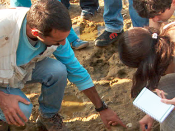Por Philip Wadler (University of Edinburgh).
Abstract
Journal of Functional Programming, Best Papers of ICFP 2012, 24(2–3), 384–418.
Continuing a line of work by Abramsky (1994), by Bellin and Scott (1994), and by Caires and Pfenning (2010), among others, this paper presents CP, a calculus in which propositions of classical linear logic correspond to session types. Continuing a line of work by Honda (1993), by Honda, Kubo, and Vasconcelos (1998), and by Gay and Vasconcelos (2010), among others, this paper presents GV, a linear functional language with session types, and presents a translation from GV into CP. The translation formalises for the first time a connection between a standard presentation of session types and linear logic, and shows how a modification to the standard presentation yield a language free from deadlock, where deadlock freedom follows from the correspondence to linear logic.
Short Bio
Philip Wadler is Professor of Theoretical Computer Science at the University of Edinburgh and Senior Research Fellow at IOHK. He is an ACM Fellow, a Fellow of the Royal Society of Edinburgh, and editor-in-chief of Proceedings of the ACM for Programming Languages. He is past chair of ACM SIGPLAN, past holder of a Royal Society-Wolfson Research Merit Fellowship, winner of the SIGPLAN Distinguished Service Award, and a winner of the POPL Most Influential Paper Award. Previously, he worked or studied at Stanford, Xerox Parc, CMU, Oxford, Chalmers, Glasgow, Bell Labs, and Avaya Labs, and visited as a guest professor in Copenhagen, Sydney, and Paris. He has an h-index of 66 with more than 22,000 citations to his work, according to Google Scholar. He contributed to the designs of Haskell, Java, and XQuery, and is a co-author of Introduction to Functional Programming (Prentice Hall, 1988), XQuery from the Experts (Addison Wesley, 2004) and Generics and Collections in Java (O'Reilly, 2006). He has delivered invited talks in locations ranging from Aizu to Zurich.
Sponsor
Palestra financiada pelo LASIGE, através do financiamento do projeto estratégico da Unidade, com a referência FCT UID/CEC/00408/2013.

























